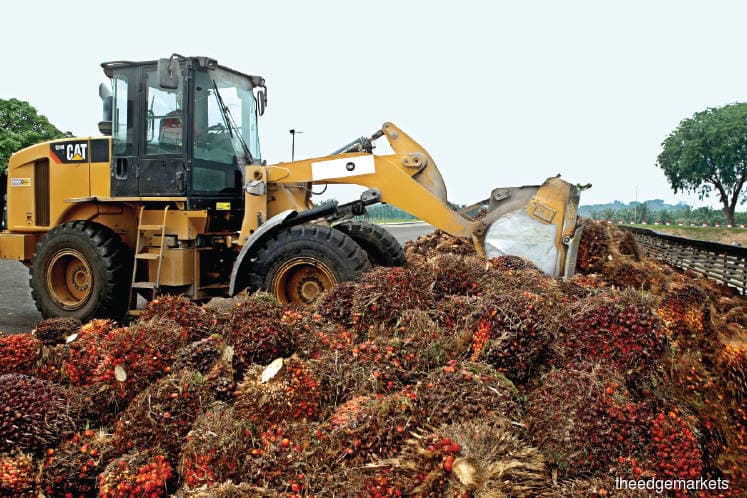
This article first appeared in The Edge Financial Daily on October 21, 2019
Plantation sector
Maintain market weight: As of Oct 16, 2019, crude palm oil (CPO) spot and three-month futures prices were at RM2,115 and RM2,201, recovering from the lows of RM1,976 and RM2,013 respectively in Aug 19. The lower-than-expected production in the third quarter of calendar year 2019 (3Q19) and relatively good demand from India and China led to a slower inventory build-up.
The proposals in Budget 2020 for the plantation sector will bring positive impact on the sector, especially from the B20 biodiesel implementation. The proposed B20 biodiesel implementation could absorb 10-15% of Malaysia’s CPO production, which could lift CPO prices and mitigate the potential impact from Europe’s restriction on the use of palm oil for biofuel (around four tonnes). Demand for palm oil might be further boosted by the revised lower export duty. On the supply side, we reckon the replanting loans came at the right time to relieve the burden of smallholders in their replanting activities.
Industry players are relieved that the increment in the minimum wage applies only to major cities, as most plantation estates are not located there. However, the increment is still unclear for those with downstream operations in Port Klang and Pasir Gudang. If the minimum wage applies nationwide, this would impact palm oil players’ earnings as the increment in production and prices would not be able to fully offset higher staff cost.
We reckon the projected high CPO production numbers given in the Economic Outlook 2020 would be difficult to achieve. Based on the 21 tonnes projection in the Economic Outlook 2020 for 2019, CPO production in 4Q19 would have to be 5.8 tonnes. This may be hard to achieve as fourth quarter production has historically been at 5-5.5 tonnes. Also, the drier weather and haze in 3Q19 and lower fertiliser application since late-2018 could lead to smaller fruit bunches and lower oil extraction rate. The projected CPO production of 22.2 tonnes for 2020 also appears to be a tough target. We estimate 2019 production at 20.0-20.2 tonnes and 2020 production to be at best flat year-on-year (y-o-y).
CPO prices should have bottomed and downside is offset by improving soybean prices and high crude oil prices. We also expect the palm oil oversupply to ease leading up to 4Q19-2020. However, the recent price recovery is relatively muted for Malaysia-based plantation companies as production growth is expected to be flat or just marginally higher y-o-y for 2019. We are expecting slower production growth in second half of CY19. On the cost side, the higher minimum wage will not be fully offset by the marginal increase in production. Companies with higher contributions from downstream should be able to mitigate the price impact. Among the companies under our coverage, IOI Corp has a higher downstream contribution of 52.9% of financial year 2019 (FY19) operating profit.
These are the key highlights from Budget 2020 for the plantation sector:
i) B20 biodiesel programme will be implemented by end-2020. The B20 biodiesel programme is likely to take up 500,000 tonnes per year (14% of current domestic consumption). Assuming full-year B20 biodiesel implementation, annual biodiesel consumption would be 1.26 tonnes and domestic palm oil consumption might increase to 3.6-4.0 tonnes per year. Assuming total production of 21 tonnes for 2020, the B20 biodiesel programme would be able to take up 15-20% of the total production. The B20 biodiesel programme is currently on a six-month trial. The incremental demand for palm oil from the higher biodiesel mandate will be able to boost CPO prices in 2020. This may benefit companies with biodiesel operations, such as Sime Darby Plantation, Kuala Lumpur Kepong, Genting Plantations and Sarawak Oil Palms, although the impact might be insignificant;
ii) Allocation of RM550 million in palm oil replanting unsecured loans for smallholders at interest of 2% per annum with a tenure of 12 years, including a four-year moratorium on repayment. The loan is expected to help ease the financial burden of smallholders, and comes at the right time as commodity prices are still relatively low. However, there is no impact on plantation companies as they are not entitled to the replanting loan;
iii) Allocation of RM27 million to support Malaysian Palm Oil Board to market palm oil internationally and counter anti-palm oil campaigns. Malaysia has been actively promoting palm oil internationally and is involved in anti-palm oil campaigns. This may marginally increase palm oil demand; and
iv) Lower revised export duty for CPO effective January 2020. CPO exports would be further boosted by the lower export duty.
We maintain our CPO price assumptions at RM2,100 per tonne and RM2,250 per tonne for 2019-2020 respectively.
2019 should see higher biodiesel usage, supported by the expanded biodiesel mandates in Indonesia and Malaysia. With the aggressive biodiesel blending programme planned by the Indonesia and Malaysia governments, the demand for palm oil would come in stronger which may offset the reducing biodiesel demand from the European Union.
The key risks are weakening crude oil prices and changes in government policies, especially from importing countries. Biofuel demand currently makes up close to 30% of global palm oil consumption. Thus, weakening crude oil prices could put this demand at risk. Meanwhile, key markets to monitor would be Europe (biofuel policy), India (import duty and base prices) and Indonesia (biodiesel mandate). — UOB Kay Hian, Oct 18